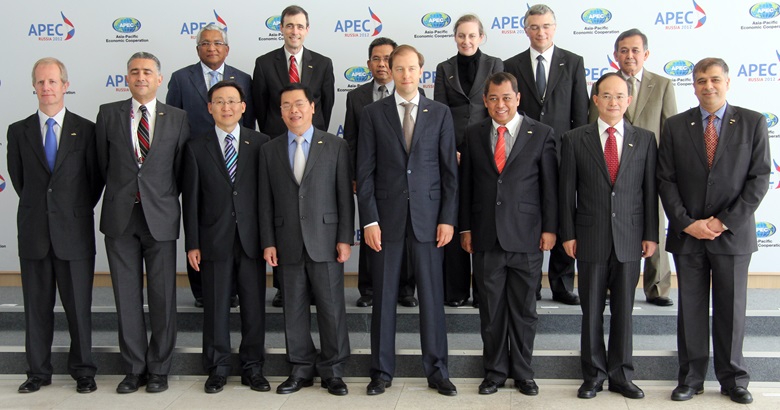2012 APEC Meeting of Ministers Responsible for Mining

Joint Statement
The fourth meeting of APEC Ministers responsible for Mining (MRM4) was held in Saint-Petersburg, Russia, on 27-28 June 2012.
At the meeting, chaired by the Minister of Industry and Trade of the Russian Federation, Mr D. Manturov, drawing on the joint resolutions from the previous APEC Mining Ministerial meetings, taking into account the 10 APEC Mining Policy Principles, as well as the results of the just-concluded meeting, the Mining Ministers of the APEC economies resolved the following:
We recognize the significance of sustainable development in mining. We believe this can be achieved through regional integration, fostering investment, increasing social responsibility, innovation and environmental advances in mining and metallurgy.
1. Regional integration, industry and social responsibility
1.1. As the biggest producer and consumer of mineral resources, the Asia-Pacific region is a key driver of global economic growth, and the APEC mining and metallurgy industries have a tremendous impact on the world’s markets for raw materials.
1.2. For the majority of the region’s economies, the mining and metallurgy industries are significant contributors to APEC economies and are of major social importance.
1.3. Fostering investment, expanding mutual trade, and increasing transparency and openness all play crucial roles in advancing trade in mining industry products as well as prosperity throughout the APEC region.
2. Investments in mining
2.1. The need to meet continued demand for mineral resources requires great activity by the APEC economies to attract and stimulate investment in the spheres of resource exploration, development, and extraction.
2.2. It is necessary to pay special attention to further development of approaches in the sphere of subsoil use in the APEC economies. These approaches should serve to promote, rather than block, investment activities in the mining sectors of the APEC economies.
2.3. In this respect, special attention should be paid to the priorities expressed by the business community, and to apply best practices for the attraction of investment in the APEC economies.
3. Innovations and environmental issues in mining and metallurgy
3.1. One of the most important tasks of the APEC economies’ authorities responsible for mining industry and metallurgy is to stimulate prospective scientific research in the exploration, development, and extraction of natural resources.
3.2. Promotion of innovation in policy (e.g. community engagement and worker health and safety) and technologies (e.g. the efficient use of natural resources, implementation of up-to-date energy-saving technologies and equipment, and sound waste management and processing practices), is crucially important for the sector’s growth.
3.3 Taking into account that the APEC economies are among the main producers and consumers of metals, we believe that recognition of metal characteristics in global and regional chemicals management must be considered in dialogues with economies inside and outside the region. Regulation firmly based on scientific evidence and data is an important prerequisite for responsible and sustainable innovation. Development of legislation and regulation pertaining to metals and their alloys must be transparent, based on sound science, should be no more trade restrictive than necessary and should take into account the consequences of such regulations. Failure to do so may have an unnecessarily negative impact on economic growth, living standards, the environment and the protection of human health and development.
4. The activities of MTF during the last years and in the future
4.1.We have approved the main results of MTF activities in the mining and metallurgy industries during the period from 2008 to 2012, which was established according to the resolutions of Ministers in 2007.
4.2. During the past period a large commitment to the activities of the MTF was done by its Chairs, Russia and China, and its co-Chairs, Peru, Malaysia, Russia, jointly with other economies, achieved significant progress in increasing the efficiency and practical activities of the MTF in implementing the 10 APEC mining policy principles.
4.3. These MTF activities have demonstrated the importance of coordinating information about policies and developments in the mining and metallurgy sectors, as well as interacting with other international bodies on these matters.
4.4. We recognize the importance of the Mining Task Force’s report on sustainable development in the APEC mining and metallurgy industries which was submitted to the United Nations. This report, “Sustainable Development in the Mining Sector in APEC”, addresses important topics such as sustainable development, corporate social responsibility, environmental protection, and the effects of European Union regulations governing nickel-containing substances.
4.5. Taking into account the long-term planning of MTF activities and the implementation of projects based on the above, we believe that, consistent with the 10 APEC Mining Policy Principles the following directions for MTF activities are important:
a. The promotion of open, transparent, and well-operating markets, as well as best practices relating to sustainable development, corporate social responsibility, clean energy, green growth, and lowering barriers to investment.
b. The promotion of best-management practices, and governance for the economic, environmental, and social aspects of sustainable development in mining, including implementation of life-of-mine monitoring, and the adoption of environmental regulations which encourage resource development while at the same time protecting human health and the environment.
c. The development of new technologies and approaches in the sphere of environmental protection, mining work safety, energy efficiency, and the processing of wastes.
d. Continuing and deepening of dialogue among the APEC economies and with other bodies, such as the United Nations and the European Union on mining issues, including the development of sound regulation of metals and their alloys firmly based on transparent and objective evidence.
e. The development of opportunities to influence the broader APEC agenda through the increasing importance of mining to the advancement and prosperity of the region.
4.6 We agree that developing activities based on these directions will help to demonstrate the value of a permanent and independent role for mining in the broader APEC agenda.

